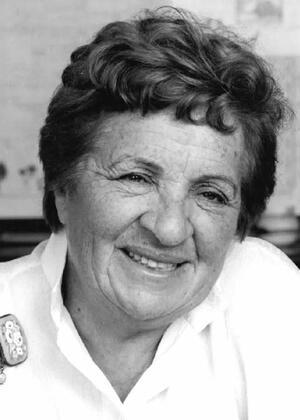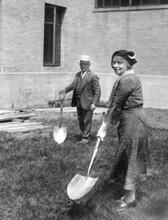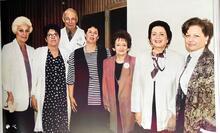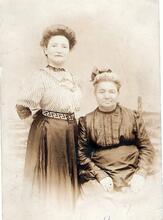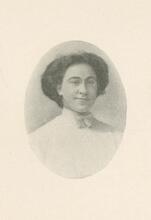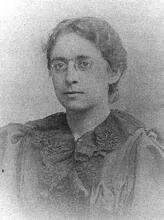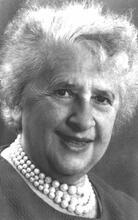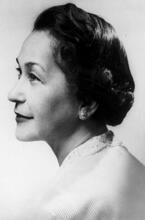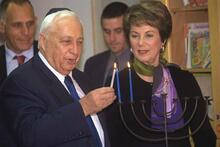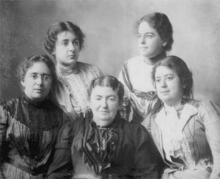Shulamith Katznelson
Shulamith Katznelson was raised in Jerusalem in a politically active and pluralistic family. She studied at David Yellin Teachers’ College and Hebrew University’s School of Social Work as well as at the University of Michigan, Ann Arbor. In 1951 she founded Ulpan Akiva, one of Israel’s first intensive Hebrew language programs for adults. Beginning in 1967, Ulpan Akiva also began teaching Arabic to Israelis, with special programs in language and culture for teachers and military officers. Katznelson also served as a founding member of the Israel Interfaith Committee and attended and spoke at several international conferences on conflict resolution. Among her many honors, she was awarded the Israel Prize for Education in 1986 and was nominated for the Nobel Peace Prize in 1992.
Early Life and Family
A prize-winning pioneer in teaching of Hebrew through intensive immersion (the ulpan method) and an ardent proponent of peaceful dialogue between Israel’s Jewish and Arab citizens, Shulamith Katznelson was born in Geneva, Switzerland, on August 17, 1919, while her parents were students there. She came to Palestine when she was two years old. Her father, Dr. Reuven Katznelson (1895–1961), was an early researcher in the inderdisciplinary blending of social work with political science. Her mother, Batsheva Katznelson (1897–1988), studied education under the noted Swiss pedagogue Jean Piaget and later became his assistant. Both parents became prominent in Israeli public life. Dr. Katznelson, a pioneer in public health and social work, established the first independent network of public health clinics in the Jewish community in Palestine prior to the establishment of the State of Israel. "Old Yishuv" refers to the Jewish community prior to 1882; "New Yishuv" to that following 1882.Yishuv. He served as the assistant to Henrietta Szold in the formative years of the Hadassah movement. Batsheva Katznelson became an educator and was also a member of the Second Lit. "assembly." The 120-member parliament of the State of Israel.Knesset. Shulamith’s brother, Shmuel Tamir (1923–1987), a highly-respected attorney and champion of legislation to protect individual rights and freedom, was a member of the Knesset (1965–1981) and Minister of Justice (1977–1980).
Katznelson’s commitment to pluralism began early in her childhood. Talbieh, the Jerusalem neighborhood in which she was raised, was a colorful mosaic of Jewish, Muslim, and Christian families who lived together in harmony. Her nursemaid during her early years was a Russian nun. This pluralism was also reflected in the broad political and social spectrum to which the various members of her family belonged. One of her uncles, Zalman Shazar (1889–1974), a member of the center-left political party Mapai, was Israel’s third president from 1963 to 1973. Avraham Nissan, Israel’s first ambassador to Sweden and an early leader in Israel’s labor movement, was another of her uncles. Yet another uncle, Joseph Katznelson, was active in the underground effort to rescue Jewish children trapped in Europe during the Holocaust.
Though the various members of her family often held diametrically opposed political views, all of them were fiercely dedicated Zionists who made a substantial contribution to the establishment and early development of the State of Israel. From this, Katznelson early in life learned the vital lesson that there is more than one path to seeking truth and that each person’s viewpoint deserves to be treated with respect and dignity.
Education and Zionist Activities
Katznelson studied in Jerusalem at the Rehavia Gymnasia, at David Yellin Teachers’ College, and at the Hebrew University School of Social Work. She continued her education in the United States on a grant from the U.S. State Department, taking master’s degree studies at the University of Michigan in Ann Arbor and additional courses at the Pendle Hill International Quaker retreat near Philadelphia.
In her youth, Katznelson was a member of Ha-Zofim, Israel’s Scouts organization, and of the Mahanot female/sing.; individual(s) who immigrates to Israel, i.e., "makes aliyah."Olim youth movements in Jerusalem. She was a volunteer agricultural worker at A voluntary collective community, mainly agricultural, in which there is no private wealth and which is responsible for all the needs of its members and their families.Kibbutz Givat Brenner and also a member of both the Haganah and the Irgun Zeva’i Le’ummi pre-State underground military organizations. She served as an underground radio announcer for the Irgun and produced a weekly program for children and young people which stressed a spirit of freedom and unity.
Her first job was with Youth Aliya at the Me’ir Shefeyah Youth Village, educating the Jewish refugees who had arrived over the dangerous mountain routes from Syria, Lebanon, and Iraq. She went on to teach at the Rehavia Gymnasia in Jerusalem and at the Le-Dugma elementary school in Tel-Aviv.
Promoting Pluralism in Adult Language Education: Establishing Ulpan Akiva
Early in 1951 Katznelson established Ulpan Akiva in Nahariyya and then moved to Netanya. Akiva was one of the country’s first three ulpans (intensive adult Hebrew language schools), under the auspices of the Adult Education Department of the Ministry of Education and Culture, in cooperation with the Aliya (immigration) Department of the Jewish Agency. She headed Ulpan Akiva from 1951 until 1996.
From its beginning, Katznelson opened Ulpan Akiva’s gates not only to immigrants, but also to veteran Israelis; to Arabs, Druze, Bedouin, and other groups living in the region; and to visitors—Jews and non-Jews alike—from around the world. Her belief that pluralism in adult education could open up pathways of dialogue and understanding between peoples—transcending national, cultural, and religious barriers—has borne much fruit and brought widespread recognition both to Katznelson and to Ulpan Akiva.
From 1967 the Ulpan under her leadership was in the forefront of promoting the study of spoken Arabic by Israelis and holding monthly Arabic courses for veteran Israelis, including school teachers on sabbatical. A course in Arabic, along with Arab culture and heritage, was held for field grade officers of the Israel Defense Forces (IDF) as part of the National Defense College. Another unique course was the eight-month intensive program for training young women soldiers from the IDF to become teachers of Arabic in Israel’s junior high and high schools. This program, run in cooperation with the Ministry of Defense, graduated its twentieth class of soldier-teachers in 1999.
The original and unique methods of teaching practiced by Shulamith Katznelson and her staff have had an impact beyond Israel. Christians, Jews, and Muslims, as well as representatives of other religions, have been among the more than 80,000 students from 148 countries who have studied at Ulpan Akiva since it was established. In 1972 there began an ongoing affiliation with the Makuya pro-Zionist movement of Japan.
Language revival is another sphere in which Shulamith Katznelson and Ulpan Akiva had an impact. The revival of Hebrew within the last century as a language of communication in all disciplines has been looked upon by many as a modern-day miracle. This has proved to be a source of inspiration to various national and regional groups which are working to revive and encourage the spread of their own once dormant languages such as Basque, Gaelic, Welsh, and Occitan. Representatives of a number of such groups have come to Ulpan Akiva or have sought the Ulpan’s assistance in their efforts. In 1990, Ulpan Akiva co-sponsored—with the Ministry of Education and Culture—an International Conference on Language Revival.
A Public Figure for Peace in Israel
On the recommendation of Martin Buber (1878–1965), Katznelson became one of the original members of the Israel Interfaith Committee. Her interest in developing adult education programs for the furtherance of Arab-Jewish relation stems from this time. In 1953 she was sent on a study mission to the United States. She represented Israel at the UNESCO Congress in Japan in 1972 and in 1983 was a member of the Israeli delegation to the Expo-Languages International Language Fair in Paris. In 1991, at the request of Israel Bonds, Katznelson spoke in several cities in the United States and Canada on behalf of their fund-raising activities for Israeli causes. She was an invited delegate and speaker at the 1992 International Conference on Conflict Resolution, entitled “Beyond Hate: Living with our Deepest Differences,” held in Derry, Ireland. This was followed by meetings in London and Paris. In February 1996 she was invited to speak at the prestigious National Prayer Breakfast in Washington, D.C., where the honored guests were President Bill Clinton and his wife, Hillary.
Katznelson and Ulpan Akiva built a long-standing relationship with the Folk High School movement and with various other Scandinavian organizations. In 1956 she was delegated to participate in the Frederika Bremer Ferbundit in Sweden, a five-week educational conference for women from Middle Eastern countries. She remained in Sweden and Denmark for six months to study the adult education programs of the Folk High Schools. In 1990 she returned to Sweden as a delegate to the international Folk High School conference and also paid a short visit to Norway. In 1992 she was a guest speaker at the conferences of the Norwegian philanthropic foundations Help Jews Home and With Israel for Peace (MIFF). She also made various other appearances at this time in Sweden, Denmark, and the Netherlands.
For her efforts in building bridges of understanding between Jews and Arabs, Shulamith Katznelson was nominated for the 1992 Nobel Peace Prize. Prior to her Nobel nomination, Katznelson and Ulpan Akiva received several awards. Among these were the 1986 Israel Prize for Life Achievement in Education (The State of Israel’s most prestigious award in this area), the Award of the Speaker of the Knesset for Quality of Life in Israel (1983), the Torch Award from the Association for Adult Education in Israel (1976), the 1991 City of Peace Award from the Rabbinical Cabinet of Israel Bonds, the 1982 award of the Interfaith Committee of the Histadrut (Israel’s labor federation), and the 1988 Award of B’nai B’rith Israel.
Katznelson retired from Ulpan Akiva in 1996 due to poor health. The ulpan continued to operate in her spirit, under the directorship of Ephraim Lapid (who in 1948 was her pupil in first grade). Since 2000 the current executive director of Ulpan Akiva is Esther Perron.
Katznelson passed away at her home in Netanya on August 6, 1999, the week of her 80th birthday.
Katznelson, Shulamith. “The Ulpan and its Students.” In Life-Long Education in Israel, edited by Kalman Yaron. Jerusalem: Public Advisory Council on Adult Education, Ministry of Education and Culture, 1972.
Silver, Eric. “Obituaries: Shulamith Katznelson.” The Independent (UK). August 21, 1999.

